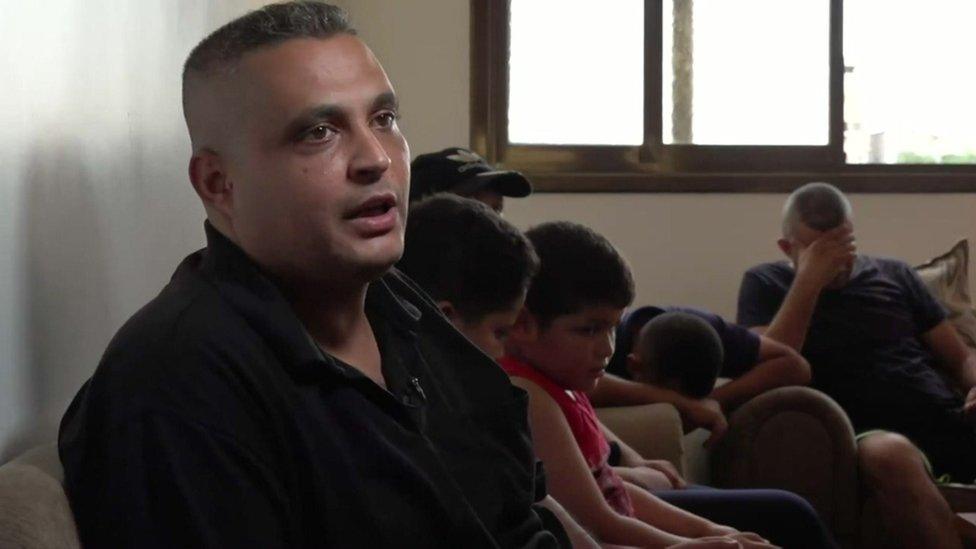'We are not leaving' - The families who won't evacuate Gaza City
- Published

Mohamed Ibrahim is sharing a flat with his extended family in a suburb of Gaza City
Hundreds of thousands of Palestinians have left northern Gaza as Israel readies for an expected ground offensive against Hamas. But despite the dangers, many are unwilling or unable to evacuate.
"I am not leaving my homeland, I will never leave," says 42-year-old Mohamed Ibrahim as he sits in a packed living room.
In video footage gathered for BBC Arabic, he is seen surrounded by relatives who have crowded into the home from other areas. Some talk, while others check their phones.
"I can't flee to another place, even if they are going to destroy our homes above our heads," he adds. "I will remain here".
Just over a week ago, Hamas gunmen infiltrated Israel from Gaza, killing more than 1,400 people.
Israel has retaliated with air strikes night and day. Thousands of its troops are massed on Gaza's borders, with Israeli Prime Minister Benjamin Netanyahu pledging to "demolish Hamas".
Mohamed Ibrahim says he and his family have repeatedly moved around the Gaza City area in recent days, responding to warnings of air strikes on this urban centre and Hamas stronghold at the heart of the northern Strip.
"Last Sunday at 2am, there were attacks and rockets," he says. "I fled with my wife and four kids."
The family left their home in Jabalia for an eastern district, but when they heard that area too was going to be targeted they ended up in a suburb of Gaza City.
His children are missing their garden, crammed in a flat with their extended family, he says. His son Ahmad cannot contact his best friend, and keeps asking whether he is alive.
Israel accuses Hamas of using civilians as human shields - which it denies - and of deliberately seeking to hide within the civilian population and infrastructure.
The Israeli military has been warning civilians to evacuate north Gaza and head to the south, and many have heeded that call, despite Hamas calls for them to remain.
Some 500,000 of the 1.1 million people are said by Israel to have left in the last 48 hours.
But Mohamed Ibrahim says he is staying put, because he sees no alternative.
"We were asked to flee to the south, where should I and my family go?" he asked.
Fayez Eltanany another resident of the north who is staying, says: "Anyone who is heading to the south is mistaken." He says he fears that if his family flees, they might never be allowed to return.

More on Israel Gaza war
Follow live: Latest updates
History behind the story: The Israel-Palestinian conflict
Gaza maps: What life is like in the Gaza Strip
Hamas' attack on Israel: Who are the hostages taken from Israel?

In the street nearby, Abo Jameel, a 38-year-old builder, crouches on the ground at a pipe connected to the water system, trying to tease out the last drops of liquid.
Israel has blocked fuel, water, food and medical supplies from entering the territory and is demanding the release of scores of hostages taken into Gaza by Hamas during its attacks.
"For eight days there has been no food or water," Abo Jameel says. "No water, no electricity, no life, misery."
He has two boys and three girls, the youngest is four. But this family is not evacuating either.
Nearly 2,700 people in Gaza have been killed in Israel's retaliatory bombardment. Thousands more have been injured.
"We have nowhere to go, we are not leaving even if they want to strike our homes," Abo Jameel says.
"Where can we go as a family of five or six people?"
Despite the dangers, children have still been playing out in the streets in Gaza City.
They take advantage of short moments of calm to go out into the alleys and roads to run around.
It is an outlet in a life which is now surrounded by war.
Almost half of Gaza's population is below the age of 18. The Palestinian Authority says more than 700 children have been killed there in this latest round of conflict already.
If Israel does launch a ground assault on north Gaza - and Hamas fighters wage a guerrilla war against them from the buildings and tunnels they have occupied in the area - there could be months of fighting which could lead to destruction of the whole area.
Tens of thousands of civilians will be caught in the middle.